The United Kingdom

It used to be the mistress of the seas and vast territories around the world in the past. It is the country where traditions are paramount.
Here people are imperturbable in their habit of standing in a queue but have not still mapped the path to codifying their Constitution as a single document.
The indigenous British lines become inevitably blurred due to the waves of immigrants. And the proper English language may be heard perhaps only deep in the countryside.

General Information
The United Kingdom is a country situated on the British Isles in the northwest of Europe. It includes England and three countries with devolved governments - Wales, Scotland, and Northern Ireland.
Apart from them, the United Kingdom also consists of several small islands. Its sovereignty spreads to the 14 Overseas Territories and the Crown Dependencies of Guernsey and Jersey, the Isle of Man in the Irish Sea, and two islands in the English Channel. However, formally, they are not part of the UK.
The British climate is temperate oceanic with prevailing rainy weather. The British have got used to joking about rains. “Other countries have a climate, in England, we have weather when it rains in the morning, when it rains in the afternoon or when it rains all day long”, they say.
The biggest amount of precipitation is in the western regions and the least - in the east. Summers are usually cool and humid, and autumns are long and rainy. As a rule, winters are mild: snow melts very quickly.
Like the Kingdom, the country has existed since 1707 after the Acts of Union of England and Scotland were adopted. In 1800, Ireland joined the Union but such composition of the United Kingdom existed only for around 120 years.
In 1922, the Irish Free State demanded complete sovereignty. As a result, the United Kingdom included only a small part of the newly-formed country - Northern Ireland. Since then, the UK has been officially known as the United Kingdom of Great Britain and Northern Ireland.
The country is governed by the Parliament and King Charles III.
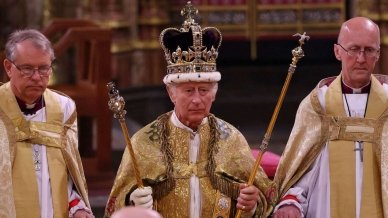
Coronation of King Charles III
The Parliament exercises making laws whereas King has to either approve or disapprove them.
Besides, King appoints and may dismiss the ministers. He may also announce the dissolution of the Parliament when necessary. As the Commander-in-Chief of the British Armed Forces, he is also empowered to declare war against other countries.
The United Kingdom still does not have the Constitution. All laws and regulations exist in the form of Treaties, Provisions, and Acts, many of which were adopted several years ago and are enforceable up to date.
Case law and constitutional conventions are of peculiar significance for all branches of power. Legal precedents depict the court decisions in various disputable cases. Conventions, in their turn, are the historically formed rules of governing the country. Both have a status of enforceable laws.
Though English is the official language, each country in the Kingdom has its own mother tongue. Gaelic is spoken in Scotland, Welsh - in Wales, and Irish - in Northern Ireland. In Cornwell, Cornish is also recognised as the regional language.
The United Kingdom has various administrative divisions. England consists of 48 counties whereas Scotland comprises 32 council areas. Wales is divided into 22 unitary authorities. There are 11 districts in Northern Ireland that have been created recently on the basis of 26 district council areas.
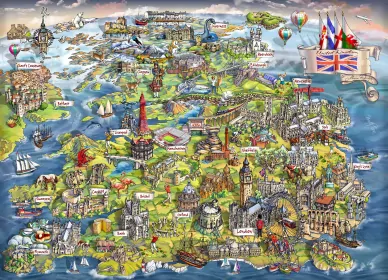
United Kingdom illustrated map
London is the capital of the entire Kingdom and England in particular. Each of its other countries also has a capital. So Edinburgh is the capital city of Scotland, Cardiff - of Wales, and Belfast - of Northern Ireland.
Almost all British borders are marine. The United Kingdom borders France to the southeast: two countries are divided by the English Channel. The only land boundary lies through Northern Ireland.
The 50-kilometre undersea tunnel, which is considered the longest in the world, connects the UK with Europe.
It takes 135 minutes to get to Paris from London by high-speed passenger train.
Until January 31, 2020, the United Kingdom was the EU member and the part of the European Economic Area, though the pound sterling remained the official currency. On the last day of the same year, Britain left the Area.
Directions
Travellers to the UK may choose different options for getting to their destinations. Flights take less time but cost more money. Heathrow, Gatwick, or Stansted are the main international airports where loads of tourists land from all over the world.
Buses and coaches are cheaper to travel by but the time of a journey will be longer. However, it is essential to book a ticket in advance. Bus services operate to and from international destinations at many UK bus stations.
The United Kingdom is a vast railway network that accepts a large influx of tourists from various cities of Britain and Europe.
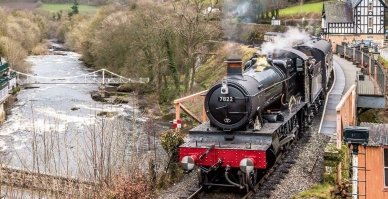
Berwyn stationmaster’s house
Accommodation
Choice of a place where to stay while in the United Kingdom as well as in any other country depends on the aim of the visit. You may book a tour around the British cities at the travel agency, which deals with all matters connected to accommodation.
If you plan the trip by yourself, England, Scotland, and other countries of the Kingdom offer many options that will meet any need. Elderly couples and families with children will find many quiet and cosy boarding houses there. Irrepressible youths and students will definitely favour budget hostels.
Castle Hotels
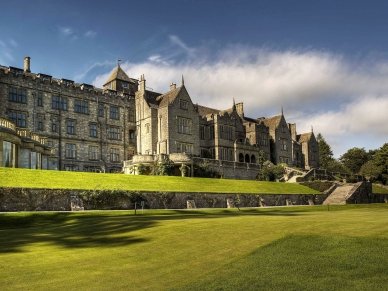
Bovey Castle, Dartmoor National Park, United Kingdom
Those fond of British history will be too thrilled to stay in a castle hotel aged 200 or even 500-800 years. These places will enable tourists to immerse themselves in the atmosphere of the Victorian era and feel the spirit of the Middle Ages.
The British castle hotels, as a rule, are located in picturesque places, often with lakes and rivers nearby. Most of them are family-run businesses concentrated in England and Scotland. Families are the owners of such hotels: not only do they deal with management but provide the necessary care about buildings and premises.
The most visited castle hotels are Amberley (Sussex, England), Stobo (Scotland), Barcaldine (Benderloch, Scotland), and Crossbasket (Blantyre, Scotland).
Old and modern eras have interwoven there. The ancient windows, doors, fireplaces, and furniture aged several centuries and retained up to date exist side by side with SPAs, fitness centres, swimming pools, and fashionable restaurants.
Any splendid occasion like a wedding, a honeymoon, or just a romantic getaway for a couple is a perfect reason to embark on a tour and stay in one of those castles.
There are also ordinary hotels in the UK that offer various levels of services depending on the star rating. Below are several options of accommodation in London and other cities:
- 196 Bishopsgate is a four-star hotel in London’s City. There are 47 rooms with a TV set, a fridge, air-conditioning, a bar, dishes, and other items in each.
- North Lees Campsite is good camping with much space for tents in Derbyshire, England. It is a perfect place for outdoor recreation.
- Thistle Glasgow is a great four-star hotel located not far from the Glasgow Central Station. Though it is the centre of Scotland’s capital, the place is calm and quiet with comfortable and clean rooms and tasty breakfasts.
- The Osbourne Hotel is a two-star hotel in the centre of Edinburgh. It is a budget but very comfortable option with free Wi-Fi.
- Wuthering Heights is small camping in Yorkshire, England. In a 20-minute drive, there is the Museum of Charlotte Brontë, the author of Jane Eyre. It is a small and cosy hotel in the style of old England that offers a space for tents, clean bed linen, tasty food, and friendly staff.
Those who plan a long-term stay in the UK would better rent a room or an apartment. The room costs much cheaper, and the least documents are required. You will not need to provide any bank statements and references from the former landlords in most cases. However, there is still one problem: the number of tourists willing to rent a room is ten times bigger than the number of rooms. That is why the search for accommodation sometimes may take months.
Renting an apartment in London or any other big city in the country is a different thing. The difficulty is not the lack of offers but the high prices and the multitude of documents required by landlords. It will be necessary to provide a bank statement, a reference letter from the previous landlord, or from your boss.
Places to See

Britain fascinates travellers from around the world with its ancient castles, bridges, cathedrals, churches, museums, and national galleries. Everything that has been inherited from the olden times is under a tender and thorough protection here.
Each city and town has its attractions - the places that remind about landmark events or prominent people. One will need a couple of months or even years to see at least some part of the cultural legacy of the British countries.
So, what should be seen first?
London
The British capital is an enormous museum itself. Some of its places became not only sightseeing attractions but the true places of worship long ago.
Big Ben is London’s symbol and the most recognisable tower in the world.
It was built in the middle of the 19th century in Westminster as a clock tower and named after St. Stephen, the first Christian martyr.
The name Big Ben was given by witty construction workers in honour of Sir Benjamin Hall, the engineer who organised and controlled the installation of the Bell on the Clock Tower. So the name has become deeply rooted as almost an official one.
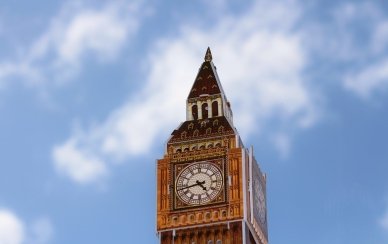
Big Ben
Buckingham Palace is the other recognised London attraction. During summer, more than 50,000 tourists visit the headquarters of King Charles III. They come here to see the royal receptions held in lush gardens with artificial waterfalls.
One more reason to visit Buckingham Palace is to see the spectacular ceremonies of Changing the Queen’s Guard - the sentries that guard the residence of British monarchs. The ceremonies take place every day from April to August, and every second day during the rest of the months.
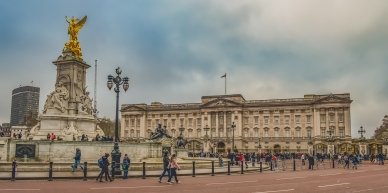
Buckingham Palace
Tower of London is a famous fortress constructed nearly a thousand years ago by William the Conqueror. This oldest building in the British capital used to be a fortress, the Royal Mint, a prison, and even a zoo during its long history.
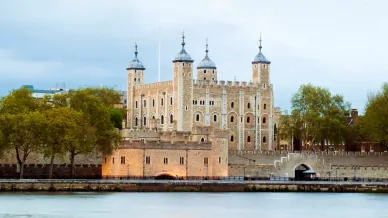
Tower of London
Tower Bridge is an engineering marvel of the 19th century, which combined technical solutions and an excellent design, unique for that time.
The bridge is movable and combines two bascules that are lifted five times a day. The process is under the control of a real captain assisted by a team of sailors.
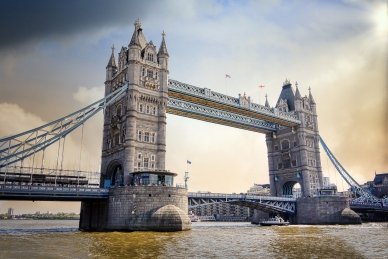
Tower Bridge
Madame Tussauds is the most famous and most visited London’s museum. Here, full-length wax figures of notable and notorious people repeat the peculiarities of their bodies and items of clothes with precise detail. The Museum’s collection comprises more than 1,000 figures. Interestingly, it takes around three months to create one wax figure.
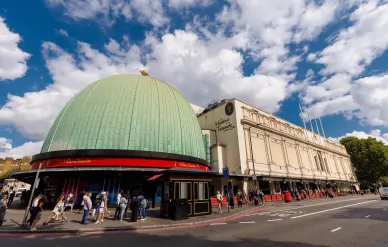
Madame Tussauds (cream building) includes the former London Planetarium (dome) since 2010
Stonehenge
Almost everyone has seen a mysterious construction made of enormously huge stones piled upon each other. This enigmatic installation is located not far from the town of Amesbury in Wiltshire county.
Researchers are still debating on the intended purpose of this architectural monument constructed in the 30th century BC. Some say it was the sanctuary of Druids while others consider it the former necropolis or observatory. In any case, this place is shrouded in mystery, so paying a visit is a must. It will leave a lasting impression.
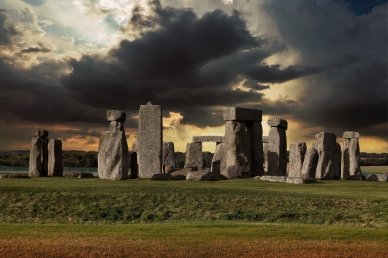
Stonehenge
Canterbury Cathedral
This is one of the oldest Christian cathedrals in the world located in Canterbury, Kent, and built at the beginning of the 11th century.
It houses the cathedra of the Archbishop of Canterbury.
The Cathedral is famous for its magnificent architecture, stained glass windows dedicated to Biblical themes, four-manual organ, and the choir that accompanies the services.
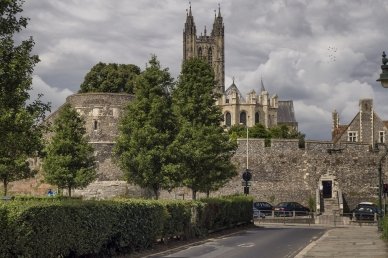
Canterbury Cathedral
Food
British cuisine has been regarded as simple and not really sophisticated. And that is partly true because many dishes require the simplest ingredients in order to avoid complicated processing.
In fact, there is no common cuisine across the country. Each region has elaborated its own unique recipes and rules for cooking meals. British cuisine comprises Scottish, English, Welsh, and Gibraltarian with their own distinctive features.
For example, a Scottish restaurant will definitely offer a filling lunch that consists of a thick soup with cereals, meat, or fish, a great helping of meat stew with oats or vegetable garnish. A dessert will contain hot tea and sweet treats like cookies or muffins.
Since Wales is close to the sea, Welsh cuisine is replete with the recipes of fish dishes. However, they still eat a lot of meat. The leek is Wales’ national symbol and an indispensable ingredient of the first and second courses.
In Wales, they eat mutton, sea fish, scallops, and shrimps most often. Tourists should also try cawl - a thick soup with meat, vegetables, herbs, and oatmeal. Cawl is very filling and full-flavoured, a true carte de visite of this British region.
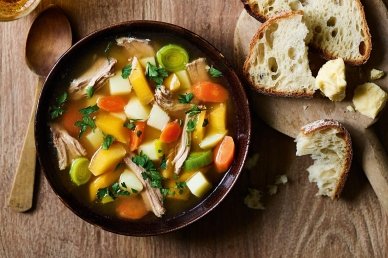
Soup Cawl
A Welsh dessert usually comprises tea and pastry like pancakes, muffins, and pies. In each house, there are unique family recipes preserved for decades.
Oats porridge originates from 16th century Scotland. It is an essential component of a typical English breakfast menu along with a slice of fried bacon and eggs.
The porridge may be often served with pate, tea, or coffee with milk.
The first courses of English cuisine are not as thick as the ones in Scotland or Wales. Most often, a first course is a cup of meat broth and croutons.
Sandwiches are considered a substantial lunch meal, not a snack. There are so many variations: with slices of cold meat and fish, cheese and seafood, vegetables and sauces. Fish-and-chips is one more favoured dish among the British. Fried fish and potatoes have remained the hands-down winner for many decades among different people.
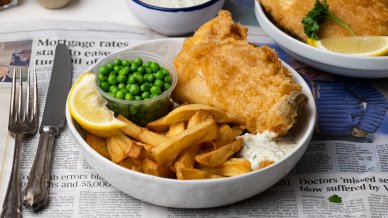
Fish-and-chips
Five-o’clock tea is a legendary British tradition well-known around the world. The fact is that drinking tea does not mean having a quick snack and sweet treats.
This is a full course that contains filling sandwiches, scones, cold cuts, cheese, and fish. However, this tradition in cosmopolitan Britain is followed less often now because of the influx of migrants and the changing pace of life.
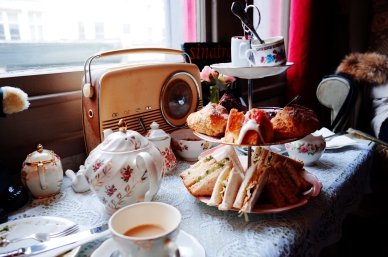
British afternoon tea
The British have their own drinking traditions.
Pubs take the lead here and enable the visitors to quench their thirst with a pint of beer.
As a rule, it is Lager or Guinness, light or dark beer respectively. People usually drink beer with chips or salted nuts, and what is more interesting, a visitor can have up to ten glasses in one night.
A pub is more than a beer shop, it is like one’s own home. The British come here to have a chat rather than to merely have a drink. Indeed, they may be in the years-long communication with their talk-partners solely here, in their favourite pub, but never outside it. They choose a pub once and for all.
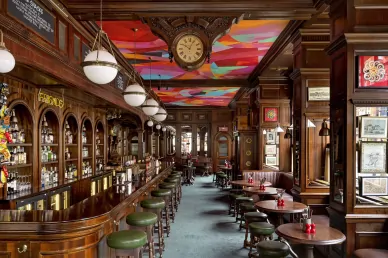
British pub
Apart from the numerous beer brands, in Britain, they drink Scotch whiskey, gin and tonic with ice, and Pimm’s. The latter one is a cold drink that consists of gin, lemonade, mint, ice, and cucumber. It is really a strong spirit, so be careful during hot summer days - the booze will go straight to your head.
Legends have grown up about the Brits. They are alleged to be demure, cold, and reserved. However, this is partly true. In fact, they are just people who love their home very much and only those whom they trust implicitly will be welcomed there. The British love animals and can even sacrifice their own lives to save those weaponless living creatures.
Many consider the Brits somewhat eccentric because of their appreciation for long-standing traditions. But they are still adored for their perfect sense of humor. That is the United Kingdom, the descendant of a great empire, where there are only three types of weather when it rains in the morning, when it rains in the afternoon or when it rains all day long.
FAQ
Is UK and Great Britain the same?
No, they are not the same. The United Kingdom (UK) includes England, Scotland, Wales, and Northern Ireland. Great Britain refers to the island comprising England, Scotland, and Wales, excluding Northern Ireland.
How many territories does the UK have?
The UK has 14 Overseas Territories. These are territories under the jurisdiction and sovereignty of the UK but are not part of the UK itself.
What are the Neighbouring countries of the UK?
The neighboring countries of the UK are Ireland to the west (sharing a land border with Northern Ireland), and near neighbors across the sea include France, Belgium, the Netherlands, and Norway.
What is the population of the United Kingdom?
The population of the United Kingdom is over 66 million people.
What is the United Kingdom capital?
The capital of the United Kingdom is London.
What type of government do they have in the UK?
The UK has a constitutional monarchy with a parliamentary democracy. The monarch is the head of state, and the Prime Minister is the head of government.
What is the currency of the UK?
The currency of the UK is the British Pound Sterling (GBP).
What is the main religion in the UK?
Christianity is the main religion in the UK, specifically Anglicanism, represented by the Church of England.
What is the UK standard language?
The standard language in the UK is English.
How many languages are in the UK?
In addition to English, there are several regional languages like Welsh, Scottish Gaelic, Irish Gaelic, and Cornish, among others.
What is the UK mostly famous for?
The UK is famous for its historical landmarks, monarchy, cultural exports like music and literature, its capital city London, and institutions such as the British Parliament.
Is the UK a powerful economy?
Yes, the UK is considered a powerful economy, being one of the largest economies in the world.
Do I need a visa to go to the United Kingdom?
Visa requirements for the UK depend on your nationality. Many countries require a visa for entry, while some are eligible for visa-free short visits.
Is the United Kingdom part of the European Union?
No, the United Kingdom is no longer a part of the European Union. The UK officially left the EU on January 31, 2020, following the Brexit referendum in 2016.
Do EU citizens need a visa to visit the UK?
Post-Brexit, EU citizens may need a visa for long-term stays in the UK, but they can generally visit visa-free for short trips such as tourism for up to six months.
Why is the UK not in Schengen?
The UK chose not to be a part of the Schengen Area to maintain control over its borders. This decision was made prior to Brexit.
What is the best month to visit the UK?
The best time to visit the UK is typically during the late spring (May to June) and early autumn (September to October). During these months, you can enjoy milder weather, fewer crowds, and the natural beauty of the countryside in bloom or the autumnal colors. The summer months (July and August) are also popular for tourists, offering warmer temperatures and longer daylight hours, but these months can be more crowded at major tourist destinations.







